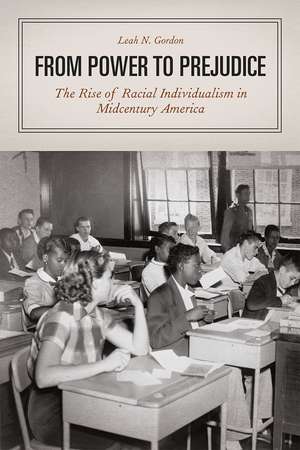From Power to Prejudice: The Rise of Racial Individualism in Midcentury America
Autor Leah N. Gordonen Limba Engleză Paperback – 9 sep 2016
Americans believe strongly in the socially transformative power of education, and the idea that we can challenge racial injustice by reducing white prejudice has long been a core component of this faith. How did we get here? In this first-rate intellectual history, Leah N. Gordon jumps into this and other big questions about race, power, and social justice.
To answer these questions, From Power to Prejudice examines American academia—both black and white—in the 1940s and ’50s. Gordon presents four competing visions of “the race problem” and documents how an individualistic paradigm, which presented white attitudes as the source of racial injustice, gained traction. A number of factors, Gordon shows, explain racial individualism’s postwar influence: individuals were easier to measure than social forces; psychology was well funded; studying political economy was difficult amid McCarthyism; and individualism was useful in legal attacks on segregation. Highlighting vigorous midcentury debate over the meanings of racial justice and equality, From Power to Prejudice reveals how one particular vision of social justice won out among many contenders.
To answer these questions, From Power to Prejudice examines American academia—both black and white—in the 1940s and ’50s. Gordon presents four competing visions of “the race problem” and documents how an individualistic paradigm, which presented white attitudes as the source of racial injustice, gained traction. A number of factors, Gordon shows, explain racial individualism’s postwar influence: individuals were easier to measure than social forces; psychology was well funded; studying political economy was difficult amid McCarthyism; and individualism was useful in legal attacks on segregation. Highlighting vigorous midcentury debate over the meanings of racial justice and equality, From Power to Prejudice reveals how one particular vision of social justice won out among many contenders.
Preț: 218.85 lei
Nou
Puncte Express: 328
Preț estimativ în valută:
41.88€ • 43.27$ • 34.86£
41.88€ • 43.27$ • 34.86£
Carte tipărită la comandă
Livrare economică 25 martie-08 aprilie
Preluare comenzi: 021 569.72.76
Specificații
ISBN-13: 9780226419411
ISBN-10: 022641941X
Pagini: 288
Ilustrații: 8 halftones
Dimensiuni: 152 x 229 x 18 mm
Greutate: 0.37 kg
Ediția:1
Editura: University of Chicago Press
Colecția University of Chicago Press
ISBN-10: 022641941X
Pagini: 288
Ilustrații: 8 halftones
Dimensiuni: 152 x 229 x 18 mm
Greutate: 0.37 kg
Ediția:1
Editura: University of Chicago Press
Colecția University of Chicago Press
Notă biografică
Leah N. Gordon is assistant professor of education and (by courtesy) of history at Stanford University.
Recenzii
"With its five institutional case studies, From Power to Prejudice offers a new interpretation of the rise and fall of anti-prejudice education in the United States. While others have emphasized the structural causes of racial inequality and discrimination in American life, Gordon highlights the ways in which an ideology of racial individualism—the notion that a society's racial order hinges on individual attitudes—came to shape American psychology, sociology, and ultimately education in the mid-twentieth century. The result is a refreshingly critical look at the relationship between social science and social reform."
“From Power to Prejudice is a powerfully argued, deeply grounded study of a crucial period in the development of American racial discourses. The strength of Gordon’s work lies in the depth of the archival research and her judicious culling of evidence from that research base to illustrate the complexity of the relationship between theory and practice in this thorny area of inquiry. This is an important and compelling study.”
"What kind of people become racists? Gordon shows how mid-century Americans came to see racism as a personal problem, rooted in individual psychology rather than structural inequality. But socio-economic theories of prejudice continued to sprout, especially at historically black colleges and universities, where scholars connected racism to labor markets, housing patterns, and educational opportunity. What kind of society produces racial injustice and discrimination? That's a very different order of question, and Gordon's tightly argued book calls us to answer it."
“Gordon has written a carefully reasoned account of how and why American liberals turned to individualized ways of framing the race issue in the decades after World War II, with social scientific theories and legal strategies that treated racial inequality as a problem of white prejudice and individual rights violations that could be educated or litigated away. Her explanation is multi-layered and convincing—about the basis of racial individualism’s appeal, about the decidedly uneven compromises it exacted, and about the long-term consequences of postwar liberalism’s constrained vision of racial reform.”
“In this highly original book, Gordon provides a rich historical account of how, in the years after World War II, American culture came to understand racism as a product of personal prejudice rather than social structure. She shows how this sudden turnaround in conventional wisdom arose from a convergence of factors—including the rise of survey research, which provided a scientific way to measure attitudes; the attraction of this method for both researchers and research funders, as providing a less political and more ‘objective’ way to analyze race; and the usefulness of this approach for advocates of school desegregation, who saw that if prejudice was the problem then education was the answer.”
“Gordon’s tightly organized intellectual history investigates a transitional era in the development of thinking about race following WWII. What the author calls racial individualism became the dominant framework for discussing racial issues among US intellectuals, particularly in the social sciences. . . . Scholars in fields that address historical and current race relations will discover valuable insights in this extremely well documented and carefully argued study. Highly recommended.”
“Gordon has effectively appropriated and synthesized social scientific methods and ideas in order to probe mid-century social science. It is a delicate balancing act that she pulls off with aplomb. . . . She builds a convincing case against racial individualism and, with the benefit of hindsight, for the utter inadequacy of the educational interventions that it inspired.”
“An original and compelling study of . . . racial individualism, an intellectual paradigm that identified prejudice and discrimination as the root causes of racial conflict. . . . From Power to Prejudice is not a quick read, but it is well worth the effort. A scholar’s text, Gordon’s work makes an important contribution to our collective understanding of the American past.”
“Gordon’s very carefully researched book offers a nuanced picture of the complex transformation of post-war conceptualizations of racism in the social sciences. Focusing on the peak of racial individualism in the USA from 1948 to 1964, Gordon traces how individualistic approaches towards racism became favoured over legal, structural, and conflict theories after the Second World War. . . . Gordon’s book provides readers from history, sociology, political science, education, and political activists with a rich study illuminating the historical struggles on which the contemporary discursive arena of scholarly negotiations of racism, its roots and solutions, rests.”
“In this carefully designed, exhaustively researched, and persuasively argued book, Gordon reveals the monumentally important but previously occluded history of how social science research on race in the mid-twentieth century came to revolve around questions of prejudice rather than around conditions of power. Gordon shows how foundation funding, the politics of postwar knowledge production, and a rightward drift in the national political culture all worked in concert to promote what she names as racial individualism, an approach that promotes an understanding of racism as private, personal, individual, and aberrant. . . . A tour de force of excellent research, astute analysis, and empirically rich and theoretically broad and persuasive exegesis and argument.”













